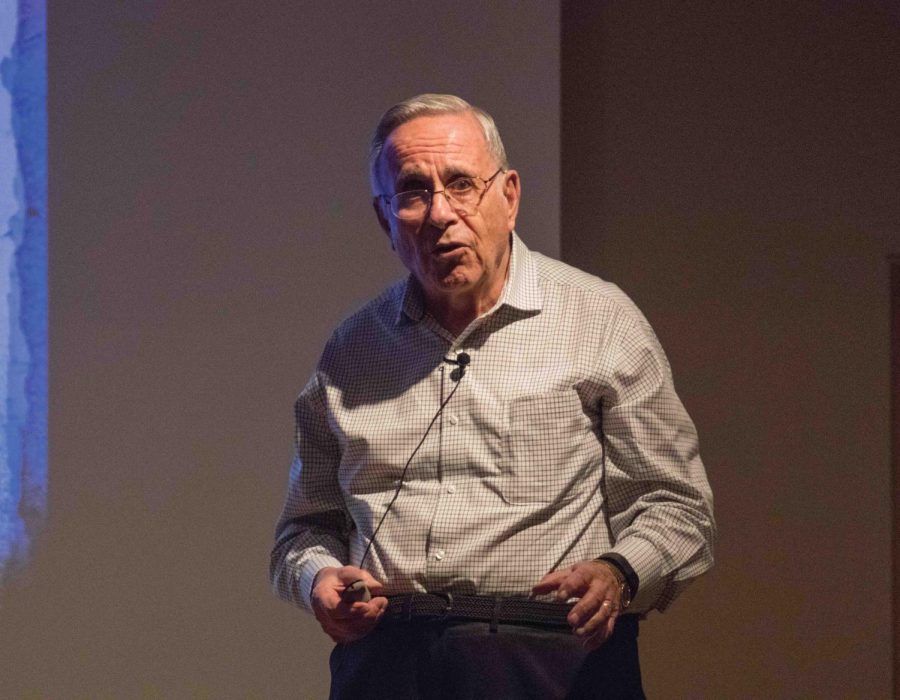Holocaust survivor visits Hearst Center
Steen Metz, a Holocaust survivor from Denmark, gave a presentation on his experiences being arrested and taken to Theresienstadt Concentration Camp in Czechoslovakia in 1943.
Nov 1, 2018
The Hearst Center for the Arts was packed on Oct. 30 as people flocked to hear Holocaust survivor Steen Metz.
There was only standing room left available as Metz told the story of how, as a child in Denmark, he and his family were arrested and taken to Theresienstadt Concentration Camp in Czechoslovakia.
Metz’s main goal with his presentation, titled “My Story: Surviving the Holocaust,” was to reach as many people as possible. He had already reached over 60,000 people and hoped to eventually reach over 100,000, he said.
“I have to tell you, I’m thrilled to see so many young people. You’re the future of America,” Metz said. “It’s very, very important to me to spread the word to as many people as possible.”
Throughout his presentation, Metz highlighted how Denmark’s occupation was quite unique compared to that of other countries in Europe.
Denmark was occupied by Germany in April 1940. Metz said that for the first two-and-a-half years, conditions were relatively normal. He recalled how he and his family were even able to go on a vacation during the occupation.
However, things changed for Metz and his family in 1943 when tensions began to rise between the people of Denmark and German soldiers. That year, the German army began looking for the small population of Jews living in Denmark.
Metz said that a large number of the Jewish people in Denmark were able to escape to Sweden by hiding on boats that were traveling over the channel. Sadly, this was not the case for Metz and his family.
On Oct. 2, 1943, Gestapo officers came knocking on the door of the Metz family’s home in Odense, Denmark. Metz was eight years old. He and his family were only given a 45-minutes notice to get their things packed.
Along with about 60 other Jewish people in his hometown, Metz and his family were rounded up and thrown on a cargo train to be taken to the concentration camp. They were forced to travel on this train with no food or water for over 80 hours.
They arrived at Theresienstadt concentration camp in Czechoslovakia, about 550 miles south of Denmark. Metz stressed that this particular camp was solely a work or slave labor camp, not an extermination camp like Auschwitz.
“We spent 18 months in the camp and my mother would refer to it as ‘18 months of hell,’” Metz said.
During those months, Metz and his family were subjected to starvation and twelve-hour days of hard work. Also, during this time, Metz’s father passed away due to the harsh conditions. Metz said that 35,000 of the over 100,000 inmates in the camp passed away in the three-year period that it was open. Most of those deaths were due to starvation.
Upon leaving the camp, Metz was able to continue his schooling and eventually go to college. After college, he traveled the world through his job at the Danish Food Company and eventually ended up in the United States, where he has been since 1962.
Metz continued to stress the importance of sharing stories like his. He said that eventually, the next generation would be the ones who would have to pass on the stories to their children.
“Time is running out,” Metz said. “In five to ten years, none of us will be able to share our experiences.”
Metz’s visit was sponsored by the Hearst Center for the Arts and the UNI Center for Holocaust and Genocide Education. The event was one of several organized to commemorate the 75th anniversary of the rescue of Jews in Denmark in 1943.









